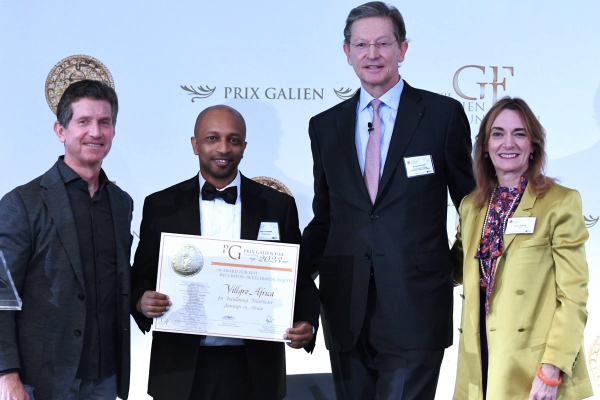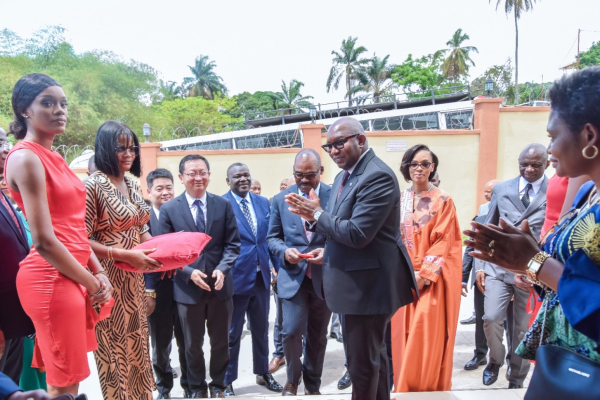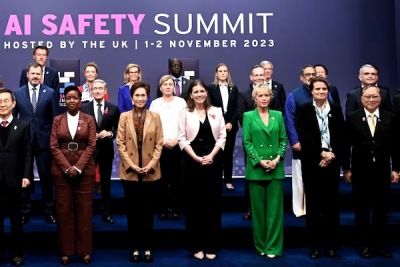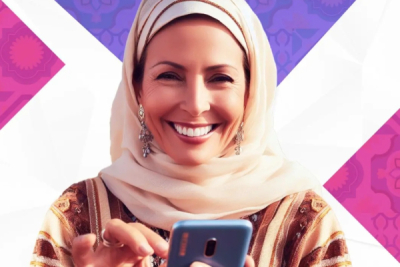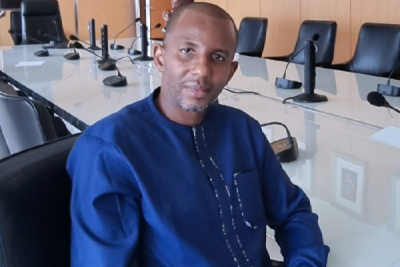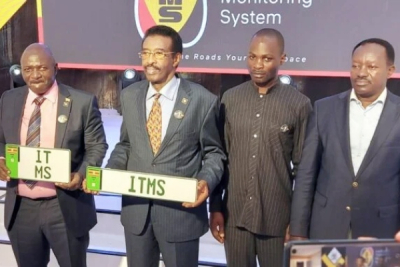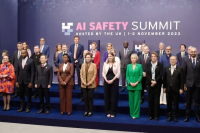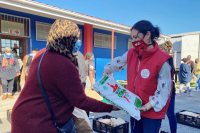On Thursday, October 26, the Prix Galien USA Awards committee announced the winners of the 2023 edition of the Prix Galien USA, named after the forefather of modern medicine and pharmacology. Kenyan incubator Villgro Africa, which supports startups operating in the healthcare sector, was selected in the Best Incubator and Accelerator category.
Last November 2, DRC Prime Minister Sama Lukonde Kyenge officially inaugurated a data center built by Huwaei at the Ministry of Finance headquarters in the framework of a project to modernize ICT infrastructure.
The data center, financed by the Export-Import Bank of China, will centralize, merge, secure, and store the activities of the country's financial authorities.
The African continent has a number of assets to help it become a leader in the field of artificial intelligence, including its young population. However, it needs to groom those assets to be able to capitalize on available opportunities.
The UK and partners have pledged £80 million ($100 million) to accelerate development in several African countries through the use of artificial intelligence (AI). The investment was announced, by the British government, at the AI Safety Summit held in England from November 1 to 2.
The first phase of the project, which will initially focus on sub-Saharan Africa, aims to, among other things: create or develop at least 8 responsible AI research labs in African universities; help at least 10 countries create robust regulatory frameworks for responsible, fair and safe AI; help reduce barriers to entry for African "AI-innovators" into the private sector.
"This collaborative initiative is of paramount importance as it empowers African countries to become producers, not just consumers, in the AI revolution, ensuring that we are at the forefront of shaping our own future and driving sustainable progress across the continent," said Paula Ingabire, Rwanda's Minister of Information Technology and Innovation.
According to a UK government's press release, this new collaboration is part of a wider UK commitment to harnessing the opportunities of AI and “ensure its use as a force for good.”
As part of the partnership, AI scholarships will be awarded to students at African universities. The collaboration will also support investment in the creation of data models ensuring an accurate representation of Africa. In addition, it will enable the establishment of responsible AI governance frameworks to manage the potential risks associated with its use.
Samira Njoya
During the Covid-19 pandemic, the two brothers behind the solution felt the heightened need to send funds to their relatives but, the available solutions were not up to their taste. With their backgrounds in finance and IT, they then decided to set up a proper solution. A few years later, MyEasyTransfert was born.
MyEasyTransfert is a fintech solution developed by a Tunisian startup. It enables Tunisians living in Europe to send money to their loved ones via a mobile app or web platform from a smartphone or computer. The startup was founded in 2022 by the Khenissi brothers, Ismaïl and Jabrane. Last week, it announced the successful completion of a €500,000 financing round to improve its technology and expand into new African markets.
"We want to offer every Tunisian living abroad the possibility of managing all their financial transactions to Tunisia from their smartphone with our platform," explains Ismaïl Khenissi.
The MyEasyTransfert mobile application is available for iOS and Android devices. After downloading the mobile application, the user creates an account by entering personal information. They then receive an activation link, which they click on to activate the newly created account. After these various steps, the user can create a list of beneficiaries, i.e. people to whom he or she often sends money in Tunisia. Depending on the beneficiary's geographical location, they can send the funds to be withdrawn in cash at the nearest withdrawal point.
Currently, the solution is accessible from Austria, Belgium, Germany, Spain, France, Greece, the Netherlands, Italy, Luxembourg, and Portugal. But, it plans to add new countries. In addition to the Tunisian diaspora, it aims to enable members of the Malian, Senegalese, and Moroccan diasporas to use MyEasyTransfert to send remittances to their countries.
Since its launch, the Android version of the application has already been downloaded more than ten thousand times, according to Play Store statistics.
Adoni Conrad Quenum
In a constantly evolving world, entrepreneur Nazib Ba shines for his innovative endeavors. Through his company Kori Tech, he creates and markets solutions that simplify the lives of Senegalese people.
Nazib Ba (photo) is the co-founder and CEO of Kori Tech, a Senegalese fintech startup founded in 2019. Through this company, the Senegalese entrepreneur helps clients easily scale up. The company offers cashless payment solutions leveraging the Internet of Things (IoT).
Its two flagship products are namely KoriPass and KoriSchool. KoriPass is a payment and customer loyalty system designed for merchants. It enables merchants to accept various mobile payment methods, such as Wave, Orange-Money, and Free, through a single terminal. It also allows merchants to build customer loyalty using connected objects such as bracelets, stickers, or key rings.
Meanwhile, KoriSchool is an innovative system for scoring and tracking students and teachers using the IoT. This platform, designed specifically for schools, offers the possibility of tracking student attendance, as well as managing and monitoring course progress in real-time.
Currently, Kori Tech has more than 50 merchants, over 1,500 KoriPass customers with over 5,000 transactions carried out every month, and more than 1,000 KoriSchool students. Thanks to KoriPass, it was the finalist of the Ecobank Fintech Challenge 2023. In October 2023, it was selected to join the fourth cohort of the ASIP accelerator program. That selection entitles it to an intensive three-month coaching and support program as well as benefits worth $750,000 to accelerate its growth.
Since June 2018, its CEO, Nazib Ba, is the chief operating officer of the real estate company Youmboye. In December 2018, he spent one month as the manager of Frip & Chic, a fashion, end-of-line, and second-hand clothing and accessories boutique.
Melchior Koba
Over the past few years, African governments have multiplied initiatives to combat insecurity. The integration of digital technology is likely to bolster those initiatives.
On Wednesday, November 1, the Ugandan government launched its Intelligent Transport Monitoring System (ITMS), known as digital license plates. The system aims to integrate digital tracking chips into all car license plates registered in the country.
"The Intelligent Transport Monitoring System, which will work in conjunction with a network of cameras and sensors, is designed to monitor traffic flow, identify and track vehicles, and detect incidents in real-time. This collective effort aims to make our roads safer for everyone," said Minister of Security Jim Muhwezi.
The said project is the result of a 10-year agreement signed in 2021, between the country's government and Russian company Global Security JSC. Under the agreement, the Russian company will provide a system that involves fitting Global Position Tracking (GPS) chips in vehicles at the owners’ expense.
The project is being piloted by the Ministry of Public Works and Transport and the Ministry of Security. The first phase aims to equip all government vehicles with these chips. The second phase, scheduled to start on February 1, 2024, will cover all other vehicles and motorcycles.
Through this project, the government aims to considerably reduce insecurity in the country. To this end, integrated plates with a security chip will be synchronized at the time of registration, with a security device capable of indicating the vehicle's location in real time. The project will also create various employment opportunities, with ongoing training initiatives in Uganda.
Samira Njoya
In line with its digital ambitions, the Nigerian government wants to connect 70% of the population to broadband Internet by 2025. The executive, in collaboration with its partners, is actively implementing measures to accomplish this crucial objective.
Tizeti Network Limited, a solar-based internet service provider, announced on Wednesday, November 1 its plan to connect 15 Nigerian states thanks to long-term funding from the Chapel Hill Denham Nigerian Infrastructure Investment Fund (NIDF).
"Chapel Hill Denham is excited to partner with Tizeti in the expansion of a fast, reliable broadband network across Nigeria. The digital economy is a key strategic pillar for Nigeria to accelerate its economic and social development, and providing access to affordable internet services is crucial to achieving the true potential of digitization," said NIDF CEO Anshul Rai.
The new initiative is in line with NIDF's strategy to fund partners to support the acceleration of digital infrastructure development in Nigeria. The aim is to support the government in its vision of achieving 70% broadband penetration by 2025. For Tizeti Network Limited, the funding supports its expansion objectives in Nigeria, where the company currently serves over 3 million subscribers.
According to Tizeti Network Limited executives, the funding will build the last-mile digital infrastructure that will shift Internet capacity to other Nigerian states and “catalyze sustained development, value creation, improved connectivity, and a deeper and wider digital inclusion net.” As a reminder, in February 2023, the country had 156.9 million Internet subscriptions, according to the regulator. The broadband penetration rate was 48.49%.
Samira Njoya
In contrast to Rwanda, Nigeria and Kenya currently lack a national AI strategy. Nonetheless, the three countries were invited to an international meeting aimed at a framework to oversee this transformative technology.
On Wednesday, November 1, at the AI Safety Summit in London, England, Nigeria, Kenya, and Rwanda signed the Bletchley Declaration, a global convention on AI-related risks. The aim is to collectively understand and manage the risks of this technology and to ensure that it is developed and deployed safely and responsibly.
"We must acknowledge that our world is experiencing significant transformation driven by the increased application of digital technologies. [...] AI at its very core offers our generation a historical opportunity to create ubiquitous access to insights and intelligence for global development. However, we must remain conscious of the need to ensure the safe ethical, and inclusive development of this phenomenon," said Bosun Tijani, Nigeria's Minister of Communications, Innovation and Digital Economy.
Since the advent of ChatGPT, an AI-based conversational agent developed by Californian technology firm OpenAI, solutions using this technology have proliferated around the world. Firms such as Google, Microsoft, Meta, and Amazon have also positioned themselves in this segment, and have stepped up their investments. They have signed several partnerships with AI companies to accelerate the development of their in-house technology or invest in promising solutions. However, authorities at various levels are growing concerned about the dimension of AI technology.
Last week, the United Nations decided to set up an advisory committee on AI. "AI could power extraordinary progress for humanity.[...] AI could scale up and amplify the work of Governments, civil society, and the United Nations across the board. [...] But all this depends on AI technologies being harnessed responsibly and made accessible to all — including the developing countries that need them most,” said Antonio Guterres, Secretary-General of the United Nations, who attended the second day of the AI Safety Summit in London, yesterday.
The United States, the United Kingdom, the European Union, and China are among the signatories of the Bletchley Declaration.
Adoni Conrad Quenum
Jessica Boonstra, the founder of Yebo Fresh, began her adventure in her garage. Fast forward a few years, she has completed several rounds of financing and is positioning her startup in a niche e-commerce segment in South Africa.
Yebo Fresh is an e-commerce solution developed by a South African startup. It enables grocery retailers in the townships of Cape Town and Johannesburg to stock up on food products from a mobile application or a web platform. The Cape Town-based startup was founded in 2018 by Jessica Boonstra. Since its launch, it has already raised around $5.5 million to accelerate its growth and diversify its offerings.
"The global e-commerce revolution should not only be accessible to a handful of South Africans, Yebo Fresh aims to extend this to the majority, and in so doing, accessing a huge untapped market. We use technology, innovative processes, and partnerships to make food shopping easier, cheaper, and safer and we assist in supporting healthier food options for our customers," said Jessica Boonstra.
The solution's mobile app is only available for Android devices. Once downloaded, users need to create an account to access the various services. They can make purchases and have them delivered to their store within 24 hours. In addition to ordering via the mobile application or web platform, it is also possible to place orders via WhatsApp. To do so, users need to send a list of groceries and follow an agent’s guidelines to complete the purchase.
Yebo Fresh has also introduced a deferred payment system. This enables retailers to stock up and pay in installments until the amount due is settled. The company is rolling out that system thanks to a 78 million ($4.2 million) funding round. "The township market is developing rapidly, and we're proud to be at the forefront of its digital revolution," says Jessica Boonstra.
Adoni Conrad Quenum
As an acceleration program, Afriquia 50 Sprints offers innovative startups in the fields of mobility and new energies. This is a unique opportunity to develop and establish a global presence.
Afriquia 50 Sprints is an acceleration and financing program created by Afriquia, a Moroccan fuel distribution company, in partnership with the incubator HEC Paris of Station F, the world's largest startup campus. The program aims to support Moroccan, African, and international startups that introduce disruptive concepts in the fields of mobility and renewable energies.
The program was launched in 2020. It offers sprinters (selected startups) access to a network of experts, mentors, partners, and investors, as well as funding. Startups also benefit from a workspace at Station F in Paris, where they can take advantage of a dynamic and diverse innovation ecosystem.
Startups selected to join the Afriquia 50 Sprints program typically develop solutions in the fields of shared services, autonomy, electrics and connectivity, smart cities, infrastructure, and the last mile segment.
Beneficiaries are incubated at Station F for three months, get support from tutors and entrepreneurs, and take part in various workshops and themed events attended by experts. Their projects are also assessed by a panel of judges at the end of the program. Throughout the incubation period at HEC Paris, Afriquia covers the startups' travel and accommodation expenses.
Some of the startups that joined the Afriquia 50 Sprints program are Pip Pip Yalah, an inter-city car-sharing application, and Cathedis, an e-logistics solution that optimizes the management of goods flows between transport players. The success of these startups is testimony to the program's positive impact on the entrepreneurial ecosystem.
Melchior Koba
More...
Fascinated by computer programming and technology from a young age, he initiated and organized hackathons and technology-centric events during his high school years. He now heads a startup that helps companies recruit the right tech profiles.
Ayhem Ghanmi (photo) is a young Tunisian entrepreneur. He is the founder and CEO of HackUp, a startup that is revolutionizing the tech talent recruitment landscape through an innovative and intelligent matching system.
Ayhem Ghanmi started programming at the age of 15. Inspired by Elon Musk, he has always been interested in Silicon Valley and the world of entrepreneurship. In 2017, the young entrepreneur began organizing technology events and mini-hackathons at Lycée Pilot de l'Ariana (LPA), where he studied from 2017 to 2021.
In 2020, he met Mohamed Aziz Najjar, who gave up his old job to join him in his project. That's how the Tunisian startup that organizes hackathons, HackUp, was born in 2020. HackUp redefines the way recruiters find developers. It developed a digital platform that uses a smart validation process, testing, assessing, and challenging candidates to reveal their tech level. Based on the scores achieved by developers, recruiters can then hire the developers they need.
Thanks to HackUp, Ayhem Ghanmi became, at the age of 18, the first high school student to be awarded the Startup Act label– A legislative measure designed to encourage the creation and development of startups in Tunisia through various incentives, including tax, social and administrative benefits– by the Tunisian government.
HackUp has organized more than five hackathons and has become the first startup in the Middle East and North Africa region to specialize in this field. Ambassador of AngelHack, a Silicon Valley startup, Ayhem Ghanmi was, between May and September 2019, the logistics and events manager for the Tunisia Education Exposition.
At the end of the fifth edition of the intensive Samsung FastTrack program, which took place in 2021, HackUp won first prize at Demo Day, the event that closed the program. In 2022, it was recognized by Najla Bouden, then head of the Tunisian government, as one of the eight startups that shone in their respective sectors.
Melchior Koba
By providing a secure and efficient means of verifying individuals' identities, digital IDs are essential tools for advancing economic growth, promoting transparency, and safeguarding human rights throughout Africa.
The Kenyan government has kicked off the pilot phase of its digital ID initiative and Maisha Namba program. This was disclosed during a recent digital ID briefing, on November 1, by Professor Julius Bitok, the Principal Secretary of Immigration and Citizen Services. The initial phase is focused on young individuals who are applying for their first identification cards as they turn 18 years old.
As part of this initiative, the government plans to transition from the existing second-generation IDs to the new Maisha Card. In that context, the pilot phase aims to identify and address any potential issues to ensure a smooth nationwide rollout.
Julius Bitok noted that "All Kenyans turning 18 years in whichever part of Kenya will be issued with a Maisha Card on a pilot basis. This way, we will establish whether there are any errors or issues before we do the penultimate launch."
The Maisha card is set to replace current national IDs and will encompass various personal identifier data over a transition period of 2 to 3 years. These digital IDs will enable convenient transactions using iris and fingerprints.
President William Ruto previously announced that Kenyans will receive the new digital identification cards starting in December. Also, the official launch of the digital ID platform, initially slated for October 2, was postponed due to unforeseen circumstances.
Over 100,000 booklets containing frequently asked questions about the new identification system have been printed to provide information to Kenyan citizens.
Hikmatu Bilali
Pan-African payments gateway MFS Africa, founded in 2009 by Dare Okoudjou (photo) and based in Johannesburg, South Africa, announced on Wednesday, November 1 its name change to Onafriq. The change comes as the firm embarks on its North American expansion after several acquisitions.
"As we embark on this next phase of our journey, we wanted a name that reflects our aspiration of wiring up the whole continent into one network of networks with pathways from and to every African and every African business," explains Dare Okoudjou.
Maisha Meds, a digital platform that helps people access healthcare at affordable costs, has received $5.25 million in scale-up funding from the US Agency for International Development (USAID).
The funds will support the startup in its aim to extend its mobile software to 7,500 pharmacies and clinics, providing subsidized care to nearly a million patients.


